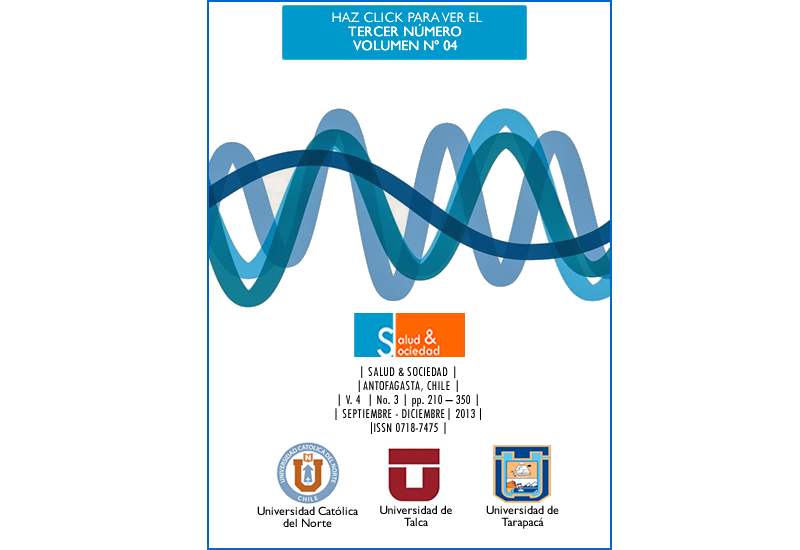Estigma hacia problemas de salud mental entre profesionales de la salud en adiestramiento en Puerto Rico.
DOI:
https://doi.org/10.22199/S07187475.2013.0003.00003Palavras-chave:
Estigma, Salud Mental, Profesionales, Puerto Rico, Stigma, Mental Health, Health Professionals,Resumo
El estigma hacia personas viven con problemas de salud mental ha sido identificado como una barrera en la búsqueda y adherencia a tratamiento. Según la literatura, los/as profesionales de la salud manifiestan actitudes estigmatizantes hacia esta población. Los estudios en Puerto Rico que documenten esta problemática son escasos. El objetivo de este estudio fue: (1) explorar los niveles del estigma que un grupo de Profesionales de la Salud en Adiestramiento (PSA) tiene o manifiesta hacia quienes presentan problemas de salud mental , (2) explorar si existen diferencias en los promedios obtenidos en la escala de estigma entre las diversas disciplinas (Psicología Clínica [PC], Trabajo Social [TS], Medicina [MD]) y (3) explorar si existen diferencias significativas en los promedios obtenidos en la escala de estigma de acuerdo al género de los/las participantes. Se administró la Escala de Estigma y Salud Mental (EESMPR) a 146 PSA. Los análisis de MANOVA revelaron que los/as PSA de MD obtuvieron las puntuaciones promedio más altas (27.8). El puntaje obtenido en la prueba de Wilks’ Lambda de .016 resultó significativo, F (2, 144) = 9.328, p <.05, sugiriendo que los promedios varían de acuerdo a la profesión. Las puntuaciones de los PSA de MD fueron significativamente mayores con un tamaño de efecto grande en comparación con los PSA de PC y moderado con los de TS. Sin embargo, los resultados no revelaron diferencias significativas entre el género y la escala general (EESMPR), Wilk’s Lambda (Wilk’s ?) = .940 F (2, 138) = 2.938, p > .05. aunque, si se identificaron diferencias significativas entre género masculino y en la sub-escala (DS), F (2, 138) = 6.860, p < .05 eta parcial, = .047. Estos hallazgos documentan la necesidad de desarrollar intervenciones para reducir el estigma hacia personas que sufren de problemas de salud mental en PSA.
Stigmatization of people who live with mental health problems has been identified as a barrier in the seeking of, adherence to, and outcomes of, treatment. Scientific literature has documented how health professionals hold stigmatizing attitudes towards this population, but few studies in Puerto Rico have documented this issue. The three-fold objective of this study is to (1) explore levels of stigmatization of people with mental health problems in a sample of health professionals in training , (2) explore differences among disciplines (psychology, social work and medicine) and (3) discover whether or not there are significant differences according to gender. The Mental Health Stigma Scale (MHSS) was administered to 146 professionals in training. A MANOVA analysis revealed that medical students obtained the highest mean scores in the scale (27.8). Scores on the Wilks’ Lambda of .016 were significant, F (2, 144) = 9.328, p <.05, suggesting that mean scores vary according to the profession. The score for the medical professionals in training was significantly higher and with a larger effect size in comparison to clinical psychologists in training. It was moderate in comparison to social workers in training. Nevertheless, the analysis revealed that the relation between gender and the general scale (MHSS) was not significant. Wilk’s Lambda (Wilk’s ?) = .940 F (2, 138) = 2.938, p > .05. However, significant differences were found between gender and the social distance subscale. ) F (2, 138) = 6.860, p < .05 eta partial, = .047. These findings document the need to develop within professional training interventions against the stigmatization of those suffering mental health problems
Referências
Angermeyer, M. C., & Dietrich, S. (2006). Public beliefs about and attitudes towards people with mental illness: a review of population studies. Acta Psychiatrica Scandinavica, 113 (3), 163-179.
Ay, P., Save, D., & Fidanoglu, O. (2006). Does stigma concerning mental disorders differ through medical education? A survey among medical students in Istanbul. Social of Psychiatry and Psychiatric Epidemiology, 41, 63-67.
Babic, D. (2010). Stigma and mental illness. Materia Socio Médica, 22, 43-46.
Beldie, A., den Boer, J. A. Brain, C., Constant, E., Figueira, M. L., Filipcic, I., …Wancata, J. (2012). Fighting stigma of mental illness in midsize European countries. Social Psychiaty and Psychiatric Epidemiology, 47, 1-38.
Bos, A. E., Kanner, D., Muris, P., Janssen, B., & Mayer, B. (2009). Mental illness stigma and disclosure: consequences of coming out of the closet. Issues in Mental Health Nursing, 30 (8), 509–513.
Centers for Disease Control and Prevention. (2011). Mental Illness Surveillance Among Adults in the United States. Retrieved from: http://www.cdc.gov/mmwr/pdf/other/su6003.pdf
Chee, C., Ng, T. & Kua, E. (2005). Comparing the Stigma of Mental Illness in a General Hospital with a State Mental Hospital: A Singapore Study. Social Psychiatry and Psychiatric Epidemiology, 45, 648-653.
Chin, S. H., & Balon R. (2006). Attitudes and perceptions toward depression and schizophrenia among residents in different medical specialties. Academic Psychiatry, 30 (3), 262-263.
Corrigan, P., Morris, S., Larson, J., Rafacz, J.,Wassel, A., Michaels, P., … Rüsch, N. (2010). Self-stigma and coming out about one’s mental illness. Journal of Community Psychology, 38 (3), 259-275.
Covarrubias, I & Han, M. (2011). Mental health stigma about serious mental health among MSW students: social contact and attitude. National Association of Workers, 56 (4), 317-3.
Dickens, G. (2008). Portrayal of mental illness and special hospitals in the UK press. British Journal of Nursing, 17 (16), 1058-1061.
DeVellis, R.F. (2012). Scale development: Theory and applications. California: Sage. Second Edition.
Dixon, R., Roberts, L., Lawrie, S., Jones, L. & Humphreys, M. (2008). Medical students’ attitudes to psychiatric illness in primary care. Medical Education 42, 1080-1087.
Gaebel, W., Zäske, H. & Baumann, A. (2006). The relationship between mental illness severity and stigma. Acta Psychiatr Scand, 113, 41-45.
Goffman, E. (1963). Estigma: la identidad deteriorada. Madrid: Amorrortu Editores.
Guimón, J. ( 2010). Prejudice and realities in stigma. International Journal of Mental Healt, 39 (3), 20-43.
Harrison, J. & Gill, A. (2010). The experience and consequences of people with mental health problems, the impact of stigma upon people with schizophrenia: a way forward. Journal of Psychiatric and Mental Health Nursing, 17, 242-250.
Hatzenbuehler, M., Phelan, J. & Link, B. (2013). Stigma as a Fundamental Cause of Population Health Inequalities. American Journal of Public Health, 103 (5), 813-821.
Henerson, M. E., Morris, L. L. y Fitz-Gibbon, C. T. (1987). How to Measure Attitudes. California: SAGE Publications.
Hinshaw, S. (2007). The mark of shame: stigma of mental illness an agenda for change. New York: Oxford University Press.
Horsfall, J., Cleary, M. & Hunt, G. (2010). Stigma in Mental Health: Clients and Professionals. Mental Health Nursing, 31, 450-455.
Kassam, A. Glozier, N., Leese, M. , Loughran, J. & Thornicrof, G. (2011). A controlled trial of mental illness related stigma training for medical students. BMC Medical Education, 11 (51),1-10.
Kessler, R.C., Aguilar-Gaxiola, S., Alonso, J., Chatteriji, S., Lee, S. Ormel, J., …Wang, P.S. (2009). The Global Burden of Mental Disorders: An Update from the WHO World Mental Health (WMH) Surveys. Epidemiol Psichiatr Soc. 18(1), 23-33.
Kessler, R.C., Chiu, W.T., Colpe, L., Demler, O., Merikangas, K.R., Walters, E.E., & Wang P.S. (2006). The prevalence and correlates of serious mental illness (SMI) in the national comorbidity survey replication (NCS-R). En Manderscheid, R.W. Mental Health United States, 2004. Rockville, MD: Substance Abuse and Mental Health Services Administration.
Lauber, C. (2008). Stigma and discrimination against people with mental illness: a critical appraisal. Epidemiologia e Psichiatria Sociale, 17 (1), 10-13.
Link, B., Castille, D. & Stuber, J. (2008). Stigma and coercion in the context of outpatient treatment for people with mental illnesses. Social Sciences & Medicine, 67, 409-419.
Link, B.G., Phelan, J.C., Bresnahan, M., Stueve, A. & Pescosolido, B.A. (1999). Public conceptions of mental illness: labels, causes, dangerousness and social distance. American Journal of Public Health. 89 (9), 1328-1333.
Lysaker, P. H., Buck, K. D., & Lintner, J. I. (2009). Addressing recovery from severe mental illness in clinical supervision of advanced students. Journal of Psychosocial Nursing & Mental Health Services, 47, 36–42.
Martínez, A., Piff, P., Mendoza-Denton, R. & Hinshaw, S. (2011). The power of a label: mental illness diagnoses, ascribed humanity, and social rejection. Journal of social and clinical psychology. 30 (1) 1-23.
Nordt, C., Rössler, W., & Lauber, C. (2006). Attitudes of mental health professionals toward people with schizophrenia and major depression. Schizophrenia Bulletin, 32(4), 709-714.
Overton, S. L., & Medina, S. L. (2008). The Stigma of Mental Illness. Journal of Counseling & Development, 86, 143-151.
Paksoy Erbaydar, N. & Çilingiroglu, N. (2010). Does medical education influence the attitudes of medical students towards individuals with mental health problems? Turkish Journal of Psychiatry, 1-11.
Pescosolido, B. (2013). The Public Stigma of Mental Illness: What Do We Think; What Do We Know; What Can We Prove? Journal of Health and Social Behavior, 54, (1) 1-21.
Piza Peluso, É. & Blay, S. (2004). Community perceptions of mental disorders: A systematic review of Latin American and Caribbean studies. Social Psychiatry and Psychiatric Epidemiology, 39, 955-961.
Rao, H., Mahadevappa, H., Pillay, P., Sessay, M., Abraham, A. & Luty, J. (2009). A study of stigmatized attitudes towards people with mental health problems among professionals. Journal of Psychiatric and Mental Health Nursing, 16, 279-284.
Rivera-Segarra, E. & Ramos-Pibernus, A. (2013). Stigma as a Social Determinant of Health: A Fundamental Cause Theory Perspective. In A. Trimboli, et al. (Eds.). Social Inclusion Trough Interdisciplinary Interventions (pp. 1027-1030). Buenos Aires: World Federation for Mental Health.
Russinova, Z., Griffin, S., Bloch, P., Wewiorski, N. & Rosoklija, I. (2011). Workplace prejudice and discrimination toward individuals with mental illnesses. Journal of Vocational Rehabilitation, 35, 227-241.
Sadow, D. & Ryder, M. (2008). Reducing Stigmatizing attitudes held by future health professionals: The person is the message. Psychological Services, 5 (4), 362-372.
Sartorius, N. & Schulze, H. (2005). Reducing the stigma of mental illness. Cambridge: Cambridge University Press.
Scheffer, R. (2003, May). Addressing stigma: Increasing public understanding of mental illness. Presented to the standing senate committee on social affairs, science and technology, Canada.
Smith, A. & Cashwell, C. (2010). Stigma and mental illness: Investigating attitudes of mental health and non mental health professionals and trainees. Journal of Humanistic Counseling, Education and Development, 49, 189-202.
Stuart, H. (2003). Violence and mental illness: An overview. World Psychiatry, 2, 121-124.
Thornicroft, G., Brohan, E., Rose, D. Sartorius, N. & Leese, M. (2009). Global pattern of experiences and anticipated discrimination against people with schizophrenia: a cross sectional survey. Lancet, 373, 408-415.
U.S. Department of Health and Human Services, Substance Abuse and Mental Health Services Administration, Center for Mental Health Services, National Institutes of Health, National Institute of Mental Health. (1999). Mental Health: A report of the Surgeon General. Retrieved from: http://profiles.nlm.nih.gov/ps/retrieve/ResourceMetadata/NNBBHS
Varas-Díaz, N., Santos-Figueroa, A., PolancoFrontera, N., Cajigas-Vargas, I., RiveraDíaz, M., Lugo-Candelas, C., RiveraSegarra, E. (2012). Desarrollo de una Escala para Medir el Estigma Relacionado a Problemas de Salud Mental en Puerto Rico. Revista Puertorriqueña de Psicología. 23, 107-118.
Varas-Díaz, N., Neilands,T., Cintrón-Bou, F.,Santos-Figueroa, A., Rodríguez-Madera, S. & Santiago-Negrón,S. (2012). The role of gender on HIV/AIDS stigma among medical students in Puerto Rico: Implications for training and service delivery. Puerto Rico Health Sciences Journal, 31 (4). 221-222.
Verhaeghe, M. & Bracke, P. (2008). Ward features affecting stigma experiences in contemporary psychiatric hospitals: a multilevel study. Social Psychiatry and Psychiatric Epidemiology, 43, 418-428.
Wesselmann, E. & Graziano, W. (2010). Sinful and/or possessed? Religious beliefs and mental illness stigma. Journal of Social and Clinical Psychology, 29 (4), 402-437.
World Health Organization (2010). Mental Health and Development: Targeting people with mental health conditions as a vulnerable group. World Health Organization. Geneva, Switzerland.
World Health Organization (2011). Mental Health Atlas 2011. Retreived from: www.who.int
Publicado
Como Citar
Edição
Seção
Los autores continúan como propietarios de sus trabajos, y pueden volver a publicar sus artículos en otro medio sin tener que solicitar autorización, siempre y cuando indiquen que el trabajo fue publicado originariamente en Revista Salud & Sociedad (ISSNe:0718-7475).



_(1).png)





